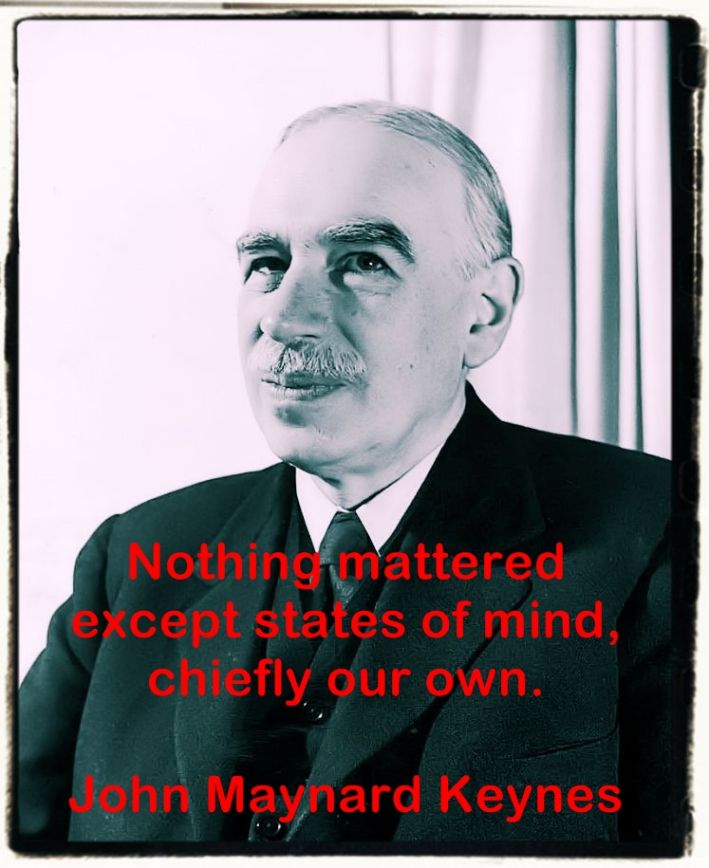
![]() Capitalism is the astounding belief that the most wickedest of men will do the most wickedest of things for the greatest good of everyone.
Capitalism is the astounding belief that the most wickedest of men will do the most wickedest of things for the greatest good of everyone.
John Maynard Keynes
The day is not far off when the economic problem will take the back seat where it belongs, and the arena of the heart and the head will be occupied or reoccupied, by our real problems – the problems of life and of human relations, of creation and behavior and
religion.
John Maynard Keynes
By a continuing process of inflation, government can confiscate, secretly and unobserved, an important part of the wealth of their citizens.
John Maynard Keynes
In the long run we are all dead.
John Maynard Keynes
The decadent international but individualistic capitalism in the hands of which we found ourselves after the war is not a success. It is not intelligent. It is not beautiful. It is not just. It is not virtuous. And it doesn’t deliver the goods.
John Maynard Keynes
Ideas shape the course of history.
John Maynard Keynes
Long run is a misleading guide to current affairs. In the long run we are all dead.
John Maynard Keynes
If economists could manage to get themselves thought of as humble, competent people on a level with dentists, that would be splendid.
John Maynard Keynes
Education: the inculcation of the incomprehensible into the indifferent by the incompetent.
John Maynard Keynes
For at least another hundred years we must pretend to ourselves and to every one that fair is foul and foul is fair; for foul is useful and fair is not. Avarice and usury and precaution must be our gods for a little longer still.
John Maynard Keynes
Words ought to be a little wild, for they are the assaults of thoughts on the unthinking.
John Maynard Keynes
The importance of money flows from it being a link between the present and the future.
John Maynard Keynes
A study of the history of opinion is a necessary preliminary to the emancipation of the mind.
John Maynard Keynes
I do not know which makes a man more conservative – to know nothing but the present, or nothing but the past.
John Maynard Keynes
It is ideas, not vested interests, which are dangerous for good or evil.
John Maynard Keynes
Nothing mattered except states of mind, chiefly our own.
John Maynard Keynes
Successful investing is anticipating the anticipations of others.
John Maynard Keynes
Americans are apt to be unduly interested in discovering what average opinion believes average opinion to be.
John Maynard Keynes
I work for a Government I despise for ends I think criminal.
John Maynard Keynes
It would not be foolish to contemplate the possibility of a far greater progress still.
John Maynard Keynes
Like Odysseus, the President looked wiser when he was seated.
John Maynard Keynes
Most men love money and security more, and creation and construction less, as they get older.
John Maynard Keynes
The avoidance of taxes is the only intellectual pursuit that still carries any reward.
John Maynard Keynes
The disruptive powers of excessive national fecundity may have played a greater part in bursting the bonds of convention than either the power of ideas or the errors of autocracy.
John Maynard Keynes
John Maynard Keynes was a member of the famous Bloomsbury Group (Literary & Literary Critical Movements) a group of writers, artists, and intellectuals living and working in and around Bloomsbury in London from about 1907 to 1930. Influenced by the philosophy of G. E. Moore, they included Leonard and Virginia Woolf, Clive and Vanessa Bell, Roger Fry, E. M. Forster, Lytton Strachey, Duncan Grant, and John Maynard Keynes.
George Edward Moore (4 November 1873 – 24 October 1958) was an English philosopher. He was, with Bertrand Russell, Ludwig Wittgenstein, and (before them) Gottlob Frege, one of the founders of the analytic tradition in philosophy. Along with Russell, he led the turn away from idealism in British philosophy, and became well known for his advocacy of common sense concepts, his contributions to ethics, epistemology, and metaphysics, and “his exceptional personality and moral character.” He was Professor of Philosophy at the University of Cambridge, a highly influential member of the Bloomsbury Group, and the editor of the influential journal Mind. He was elected a fellow of the British Academy in 1918. He is buried at the Parish of the Ascension Burial Ground in Cambridge, with his wife Dorothy Moore, nee Ely.
